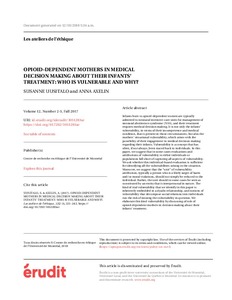OPIOID-DEPENDENT MOTHERS IN MEDICAL DECISION MAKING ABOUT THEIR INFANTS’ TREATMENT: WHO IS VULNERABLE AND WHY?
Susanne Uusitalo; Axelin Anna
https://urn.fi/URN:NBN:fi-fe2021042720358
Tiivistelmä
Infants born to opioid-dependent women are typically admitted to neonatal intensivecare
units for management of neonatal abstinence syndrome (NAS), and their treatment
requires medical decisionmaking. It is not only the infants’vulnerability, in terms of their
incompetence and medical condition, that is present in those circumstances,but also the
mothers’ situational vulnerability,which arises with the possibility of their engagement
in medical decision making regarding their infants. Vulnerability is a concept that has
often, if not always, been traced back to individuals. In this paper, we suggest that in some
cases evaluations and attributions of vulnerability to either individuals or populations
fall short of capturing all aspects of vulnerability.We ask whether this individual-based
evaluation is sufficient for identifying all the vulnerabilities arising in the situation.
Moreover,we suggest that the “unit” of vulnerability attribution, typically a person who
is a likely target of harm and/or moral violations, should not simply be reduced to the
individual. Rather, the unit should in some cases be seen as constituted by an entity that
is interpersonal in nature. The kind of real vulnerability that we identify in this paper is
inherently embedded in a dyadic relationship, and notions of vulnerability that decompose
social relations into individuals run the risk ofmissing the vulnerability in question.
We elaborate this kind vulnerability by discussing of role of opioid-dependent mothers in decisionmaking about their infants’ treatment
Kokoelmat
- Rinnakkaistallenteet [29335]
